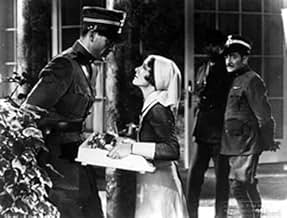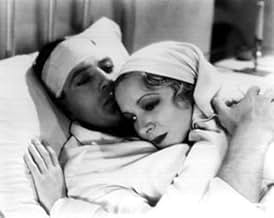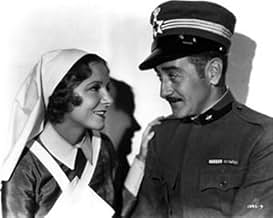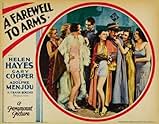NOTE IMDb
6,4/10
7,3 k
MA NOTE
Un conducteur d'ambulance américain et une infirmière anglaise tombent amoureux en l'Italie pendant la Première Guerre mondiale.Un conducteur d'ambulance américain et une infirmière anglaise tombent amoureux en l'Italie pendant la Première Guerre mondiale.Un conducteur d'ambulance américain et une infirmière anglaise tombent amoureux en l'Italie pendant la Première Guerre mondiale.
- Réalisation
- Scénario
- Casting principal
- Récompensé par 2 Oscars
- 7 victoires et 2 nominations au total
Alice Adair
- Cafe Girl
- (non crédité)
Henry Armetta
- Bonello
- (non crédité)
Herman Bing
- Swiss Postal Clerk
- (non crédité)
Agostino Borgato
- Giulio
- (non crédité)
Robert Cauterio
- Gordini
- (non crédité)
Marcelle Corday
- Swiss Nurse
- (non crédité)
Gino Corrado
- Italian Soldier
- (non crédité)
Peggy Cunningham
- Molly
- (non crédité)
George Humbert
- Piani
- (non crédité)
William Irving
- Frustrated Opera Singer
- (non crédité)
Avis à la une
When this version of A Farewell to Arms came out, Ernest Hemingway hated this film. They turned his novel and put too much emphasis on the romance angle. When Papa Hemingway said that he obviously did not know Hollywood well at all. If he did just knowing Frank Borzage directed this film should have told him something. Borzage did a whole slew of tender romantic stories in the Thirties like Three Comrades, The Mortal Storm, stuff like that. A Farewell to Arms is definitely in keeping with that tradition.
The one thing that Hemingway did like was the casting of Gary Cooper as the hero Fredric Henry. He and Coop became fast friends right up to when they both died in 1961. He saw in Cooper the ideal Hemingway hero and when Paramount acquired the rights to For Whom the Bells Toll, Hemingway insisted it be done with Cooper or nobody.
Cooper and Helen Hayes made a tender romantic couple in the Borzage tradition, probably more Borzage than Hemingway. But Adolph Zukor and Paramount also knew what sold movie tickets and Paramount was having a lot of financial troubles at this time. The studio nearly went under during the Depression. But Paramount's saviors turned out to be Bing Crosby, Mae West, and Cecil B. DeMille who returned to the studio he helped found.
Helen Hayes made several good films in the early thirties, this one and the one she won an Oscar for, The Sins of Madelon Claudet. But she never became a movie box office draw so she returned to the Broadway stage where she reigned as a Queen.
Adolphe Menjou replete with Italian accent plays Cooper's friend and romantic rival, Major Rinaldi. Menjou was great at playing both American and continental types. Soon he would sign a long term contract with MGM and gain his greatest roles during the sound era.
Hemingway purists might shun A Farewell to Arms, but those who love their screen romances, soggier the better will rave about this film.
The one thing that Hemingway did like was the casting of Gary Cooper as the hero Fredric Henry. He and Coop became fast friends right up to when they both died in 1961. He saw in Cooper the ideal Hemingway hero and when Paramount acquired the rights to For Whom the Bells Toll, Hemingway insisted it be done with Cooper or nobody.
Cooper and Helen Hayes made a tender romantic couple in the Borzage tradition, probably more Borzage than Hemingway. But Adolph Zukor and Paramount also knew what sold movie tickets and Paramount was having a lot of financial troubles at this time. The studio nearly went under during the Depression. But Paramount's saviors turned out to be Bing Crosby, Mae West, and Cecil B. DeMille who returned to the studio he helped found.
Helen Hayes made several good films in the early thirties, this one and the one she won an Oscar for, The Sins of Madelon Claudet. But she never became a movie box office draw so she returned to the Broadway stage where she reigned as a Queen.
Adolphe Menjou replete with Italian accent plays Cooper's friend and romantic rival, Major Rinaldi. Menjou was great at playing both American and continental types. Soon he would sign a long term contract with MGM and gain his greatest roles during the sound era.
Hemingway purists might shun A Farewell to Arms, but those who love their screen romances, soggier the better will rave about this film.
This story about a doomed love affair during the Italian campaign of WWI results to be the original and the best film version of Ernest Hemingway's novel. It deals with an American soldier, Gary Cooper, and a good English nurse, Helen Hayes, both of whom fall in love on the Italian front during WWI. He is an ambulance driver while braverly risking his life in the line of duty he is wounded and ends up in the hospital where he falls for the attending nurse who is caring him. In the midst of war the intimate pair of lovers fight to stay together and to survive the massacres around them. At the end Austria capitules and armistice is declared. Let's love tonight she said, there may be no tomorrow. Every woman who has loved will understand.
Sensitive and romantic story about a deep and thunderous love story set in the horrors of the WWI when were developing the bloody battles of Marne and Piave. However, the novelist Hemingway disavowed the ambiguous final, but the public all around the world loved the movie. Both protagonists, Gary Cooper and Helen Hayes give awesome acting in one of the great love stories of all time. They are finely accompanied by a nice support cast at the time, such as : Adolphe Menjou, Jack La Rue, Mary Philips, Mary Forbes, among others.
The motion picture shot in Paramount studios was well directed by Frank Borzage and it won Oscars 1933 to Cinematography : Charles Lang Jr and Sound. Filmmaker Frank Borzage was a notorious actor and director who made a lot of decent films from Silent cinema to Sound one , such as : Street angel, Flight command, Big city , Bad fire, The mortal storm, Billy the Kid, The big fisherman, being his greatest hit : The 7th Heaven. Rating 7/10 . Better than average. Well worth watching. The picture will appeal to Gary Cooper fans.
Other version about this famous story are as follows : A farewell to arms 1957 by Charles Vidor and John Huston with Rock Hudson, Jennifer Jones, Vittorio de Sica, Oscar Homolka. A farewell to arms 1966 by Tucker with Vanessa Redgrave and George Hamilton. In love and war 1996 by Richard Attenborough with Chris O'Donnell, Sandra Bullock , Mackenzie Astin.
Sensitive and romantic story about a deep and thunderous love story set in the horrors of the WWI when were developing the bloody battles of Marne and Piave. However, the novelist Hemingway disavowed the ambiguous final, but the public all around the world loved the movie. Both protagonists, Gary Cooper and Helen Hayes give awesome acting in one of the great love stories of all time. They are finely accompanied by a nice support cast at the time, such as : Adolphe Menjou, Jack La Rue, Mary Philips, Mary Forbes, among others.
The motion picture shot in Paramount studios was well directed by Frank Borzage and it won Oscars 1933 to Cinematography : Charles Lang Jr and Sound. Filmmaker Frank Borzage was a notorious actor and director who made a lot of decent films from Silent cinema to Sound one , such as : Street angel, Flight command, Big city , Bad fire, The mortal storm, Billy the Kid, The big fisherman, being his greatest hit : The 7th Heaven. Rating 7/10 . Better than average. Well worth watching. The picture will appeal to Gary Cooper fans.
Other version about this famous story are as follows : A farewell to arms 1957 by Charles Vidor and John Huston with Rock Hudson, Jennifer Jones, Vittorio de Sica, Oscar Homolka. A farewell to arms 1966 by Tucker with Vanessa Redgrave and George Hamilton. In love and war 1996 by Richard Attenborough with Chris O'Donnell, Sandra Bullock , Mackenzie Astin.
Watch for some James Dean look-alike glances in this black and white movie. It also plays a lot like "The English Patient", but not as boring. The continual bombings and chaos of the fighting was very realistic, but it didn't move the plot along as well as it might have.
Helen Hayes as the love interest does a delightful job, but it's hard not to judge this picture by the technical improvements of today's cinematographers. I too have either outgrown Hemingway, or a lot of his dialogue was cut. I suggest you go back and give the book a read, and decide for yourself. I have promised to return and see the movie again, afterwards. Gary Cooper was a really great-looking, and good acting guy.....and I've never appreciated him before so much. He had a lot of stage business that made him appear quite natural.
Adolph Menjou as the fun-loving captain did an admirable job, as well.
Helen Hayes as the love interest does a delightful job, but it's hard not to judge this picture by the technical improvements of today's cinematographers. I too have either outgrown Hemingway, or a lot of his dialogue was cut. I suggest you go back and give the book a read, and decide for yourself. I have promised to return and see the movie again, afterwards. Gary Cooper was a really great-looking, and good acting guy.....and I've never appreciated him before so much. He had a lot of stage business that made him appear quite natural.
Adolph Menjou as the fun-loving captain did an admirable job, as well.
Based on the Ernest Hemingway novel and starring Gary Cooper, this has the potential to be a classic. The setting and sentiment are reasonably original, especially for their time, and the movie is reasonably gritty.
Yet, it doesn't feel like a classic. The romance seems trite and contrived. Overly schmaltzy and sometimes just plain dull.
The acting is patchy. Gary Cooper is okay, but Helen Hayes' performance is quite flat. Most entertaining performance comes from Adolphe Menjou as Rinaldi.
It was probably quite good in its time, and might well be regarded as one of the first anti-war movies, but it now feels quite dated.
Yet, it doesn't feel like a classic. The romance seems trite and contrived. Overly schmaltzy and sometimes just plain dull.
The acting is patchy. Gary Cooper is okay, but Helen Hayes' performance is quite flat. Most entertaining performance comes from Adolphe Menjou as Rinaldi.
It was probably quite good in its time, and might well be regarded as one of the first anti-war movies, but it now feels quite dated.
A Farewell to Arms features the expected good performances from Gary Cooper, Helen Hayes, and Adolphe Menjou. For its time, it also features impressive sets. The dialogue also does justice to its source material, the Hemingway novel of the same name. This movie must've been appreciated much more at the time of its release, given the imminence of war sentiment and Hitler's rising power in Germany. All in all, a very good, though not great film, 7/10.
Le saviez-vous
- AnecdotesErnest Hemingway hated this interpretation of his novel, as he felt it was overly romantic. That didn't stop him, however, from becoming lifelong friends with Gary Cooper, whom he met several years later. In fact, it was Hemingway who would insist that Cooper be cast in the lead of the adaptation of his novel Pour qui sonne le glas (1943) 11 years later. However, the two made a point of never discussing this film.
- GaffesA night attack is shown. During World War I there was very little flying at night and the night attacks that did occur were limited to big cities. It was almost impossible for a plane to attack specific targets in a large city, so effectively attacking people on a road in the dark was not possible, and did not happen.
- Citations
Frederic: We've never been apart, really. Not since we met.
Catherine: Not since we met.
Frederic: And never can be.
Catherine: Never apart.
Frederic: In life and in death. Say it Cat.
Catherine: In life and in death, we'll never be parted.
Frederic: You do believe that, don't you, Cat?
Catherine: I believe it, and I'm not afraid.
- Crédits fousIn the original 1932 credits, the credits are punctuated by aerial bomb blasts, and every time there is a blast, a credit disappears to be replaced by the next one.
- Versions alternativesSPOILER: Paramount decided, after much disagreement, to keep Hemingway's original ending and fade out after the death of Catherine Barkley. This ending was kept for the European release, but a new ending in which Barkley lives was later added to the U.S. release.
- ConnexionsEdited into Your Afternoon Movie: Farewell to Arms (2023)
Meilleurs choix
Connectez-vous pour évaluer et suivre la liste de favoris afin de recevoir des recommandations personnalisées
Détails
- Date de sortie
- Pays d’origine
- Site officiel
- Langues
- Aussi connu sous le nom de
- L'Adieu aux armes
- Lieux de tournage
- Société de production
- Voir plus de crédits d'entreprise sur IMDbPro
Box-office
- Budget
- 799 520 $US (estimé)
- Durée
- 1h 20min(80 min)
- Couleur
- Rapport de forme
- 1.37 : 1
Contribuer à cette page
Suggérer une modification ou ajouter du contenu manquant





































